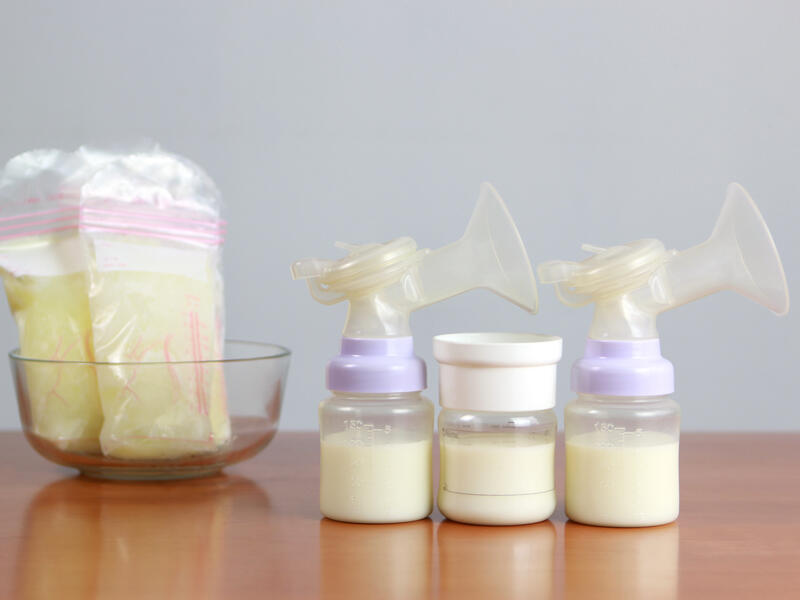For a new mother, the ability to provide nutrients for her baby is important. However, breastfeeding can be a mentally and physically draining task.
For this reason, Sanford Health’s Southpointe Clinic, with the opening of its milk bank service, aims to provide assistance for mothers in the Fargo, North Dakota, area who cannot produce milk for a variety of reasons.
Jaclyn Haak, manager of the lactation department at Sanford Health, and Shanley Jusu, a new mother who is donating her milk, give insight into what the Southpointe milk bank is, its importance, how to get involved and its impact.
The milk bank
The milk bank, in partnership with the accredited Human Milk Banking Association of North America, is a donation and outreach center. It intends to help those who are struggling with or physically unable to breastfeed. This is achieved through donations of excess milk.
“Moms who are qualified can drop off their milk, and then we freeze and send it to the milk bank in Colorado,” Haak said. “Even though it’s not a direct route, their milk is still finding its way back here.”
The donation and outreach center is a product of collaboration between the North Dakota Breastfeeding Coalition, funds from Sanford Health Foundation and Sanford Women’s at Southpointe.
“We needed a freezer and a team of people to ship the milk when it got here, and Sanford Women’s at Southpointe said, absolutely; let’s do it,” Haak said. “We’ve been receiving around 1,000 ounces a month, which is way more than I thought we would get.” In total, 6,903 ounces of milk have been donated since the center opened in May 2018.
The importance of donating
The milk bank is bringing needed assistance to new mothers in Fargo. “It’s a very stressful time for moms with babies in the Neonatal Intensive Care Unit (NICU) to make milk for their babies when they’re in their most fragile state,” Haak said. “Donor milk helps bridge that gap, and it’s important to go through a milk bank because they are able to pasteurize it to make sure it’s safe for use.”
Human milk is preferred over baby formula for many reasons. “Formula is made from a cow’s milk protein, and when they are fragile babies, that protein can be inflammatory and cause a lot of problems,” Haak said. “The longer we hold off on introducing that to those babies, the better.”
Shanley Jusu assumed she naturally would be able to breastfeed. “I didn’t realize how hard it was. We struggled a lot. It is the hardest thing I’ve ever done, physically and mentally,” she said.
“Thankfully, the lactation consultants are really helpful. We wouldn’t have made it without them.” Despite this, Jusu said it’s worth it to breastfeed. “It is so important because of the nutritional impact it makes, not just now, but later on in life as well.”
Knowing just how important it is to breastfeed and also how difficult it can be, Jusu makes a point of donating her excess milk. “I wanted to donate to give milk to others who aren’t able to produce,” she said. “It goes to Neonatal Intensive Care Unit babies and babies in need, so instead of giving formula in the hospital, they are able to give actual human milk.”
Getting involved
While donating excess milk might seem like a daunting task, the milk bank has made it quite simple. “You fill out an online questionnaire through their website. Someone from the organization calls you, then you have your doctor sign a form that says you are the healthy person you’re claiming to be,” Haak said. “Then you will get your blood tested, which we do for no cost at Southpointe.”
Haak said before the milk bank, those who wanted to donate would have to find a doctor who would order the blood test and then they would be charged that fee as well. Additionally, without the drop-off and outreach center, donors would have to wait for a mail carrier service to pick up their milk. “Now, they can come and get a blood test and drop off their milk all at Southpointe,” Haak said.
In addition to the convenience of the milk bank, Jusu says she values the approval process. “There’s quite a bit of testing that goes into it, which I appreciated,” she said. “It really reassured me that the babies are getting healthy milk that isn’t contaminated.”
Although the idea of donating milk can seem odd, Haak said it’s perfectly safe. “Milk sharing sounds a little off-putting to some people right away, but once you learn about the process, it’s really very safe and effective to these kids,” she says. “If someone has any questions about how to donate or thinks it sounds too complicated, they can always call the lactation team, and we’ll guide them through it.”
Making a difference
The milk bank donations benefit babies who rely on breast milk for nutrients as well as their mothers who are finding it difficult to breastfeed. It’s an opportunity for mothers with excess milk to help affect someone else’s life. For Haak and Jusu, just being a part of the process is rewarding.
Jusu said it’s great to know she’s making a difference. “It’s rewarding to know that I’m helping someone else’s child and that my donation is getting to babies in need,” she said.
For Haak, it’s seeing the favor returned. “I’ve had people that have needed to use donor milk and then have turned around and six months later are able to donate. It’s one of my favorite things to see.”
Learn more
- Top 10 superfoods for breastfeeding moms
- How to pump and store breast milk on the go
- How to navigate the formula shortage and feed your baby
…
Posted In Children's, Pregnancy, Women's
